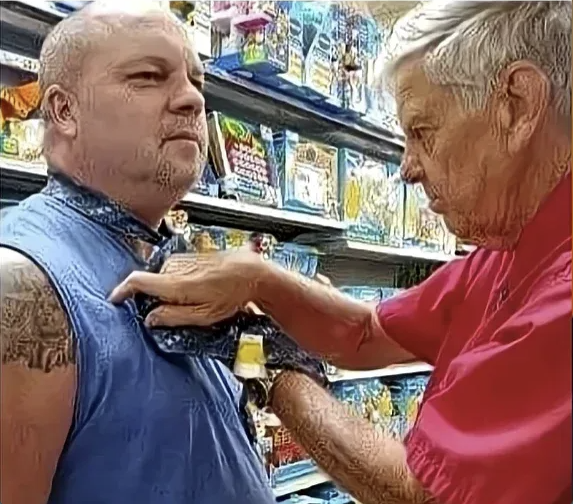
He just needed help with a tie—but received so much more. Kevin and his fiancée were shopping for clothes to wear to his father’s funeral when he realized he didn’t know how to tie a tie.
Nervously, he asked an older man nearby for help. Without hesitation, the man looped the tie around his own neck, gently joking to lighten the moment. After a few tries, he adjusted it perfectly on Kevin, then pulled him in close for a hug.
Softly, he said, “I’m so sorry about your dad.”
Kevin could barely find the words. In that moment, the kindness of a stranger spoke louder than anything else.
Kevin was shopping for funeral clothes. Not wedding attire or job interview suits—clothes to bury his father. Already emotionally raw, grieving, trying to function through the practical necessities that follow death. And he encountered a problem: he didn’t know how to tie a tie.
That’s the kind of thing fathers teach sons. Standing in front of a mirror, dad’s hands guiding yours through the steps—over, under, through, pull tight. A rite of passage, a skill passed down, a moment of connection. But Kevin’s father was dead, and he’d never learned. And now he needed to wear a tie to his father’s funeral but didn’t know how.
Nervously, he asked an older man nearby for help. Think about the vulnerability in that moment. Asking a stranger for help with something you feel like you should know. Admitting ignorance about a basic male skill. Approaching someone in a store and revealing, implicitly, that your father never taught you this and now he’s dead and you need to learn from a stranger.
Without hesitation, the man helped. Didn’t make Kevin feel stupid. Didn’t ask why he didn’t know. Just immediately stepped in to help. And he did something brilliant: he looped the tie around his own neck first, demonstrating, gently joking to lighten the moment. Making Kevin smile during one of the darkest periods of his life.
After a few tries, he adjusted it perfectly on Kevin. Taught him, patiently, the way a father would. Then pulled him in close for a hug. Not just finishing the task and walking away, but offering physical comfort, human connection, acknowledgment of what Kevin was going through.
Softly, he said, “I’m so sorry about your dad.” He understood. The stranger in the store teaching tie-tying wasn’t just helping with a practical problem. He was standing in for Kevin’s father, providing the lesson and comfort that should have come from the man Kevin was about to bury. And he acknowledged that—expressed condolences, made space for grief, let Kevin know his loss was seen.
“Kevin could barely find the words.” Because what do you say to a stranger who just gave you something profoundly meaningful? Who taught you what your father should have, who hugged you when you needed it, who acknowledged your loss with genuine compassion? Words feel inadequate.
“In that moment, the kindness of a stranger spoke louder than anything else.” That sentence captures everything. Not just the practical help—anyone could have taught Kevin to tie a tie. But the way it was done: with patience, humor, a hug, condolences. With recognition that this wasn’t just about a tie but about a son preparing to bury his father. With kindness that transcended the transactional and became profound human connection.
The photo shows the moment—older man in red shirt adjusting the tie on Kevin (in blue vest), both standing in a store aisle. You can see the tenderness, the focus, the intimacy of the gesture. This stranger is giving Kevin what his father can’t anymore: guidance, support, acknowledgment that he matters.
This story matters because it shows how strangers can provide what family can’t. Kevin’s father was dead, couldn’t teach him to tie a tie for the funeral. But a stranger in a store stepped in, provided that paternal guidance, filled a gap that death had created.
It reminds us that moments of grief make us vulnerable, and kindness during vulnerability has outsized impact. Kevin was already raw from his father’s death. The stranger’s gentle teaching, the hug, the condolences—these weren’t just nice gestures. They were exactly what Kevin needed when everything hurt.
And it challenges us to recognize when “small” requests signal bigger needs. Kevin asked for help with a tie. But the stranger understood—or intuited—that more was needed. So he gave more: humor to lighten the moment, patience in teaching, a hug, condolences. He didn’t just solve the problem; he provided comfort.
Kevin needed help with a tie. He received so much more: a lesson, a hug, acknowledgment of his grief, and reminder that even in darkest moments, strangers can provide exactly the kindness we need. The man who helped him will probably never know how much that moment mattered. But Kevin will carry it forever—the stranger who stood in for his father, who taught him to tie a tie for his father’s funeral, who said “I’m so sorry about your dad” and meant it with his whole heart.